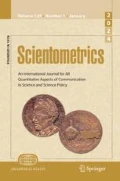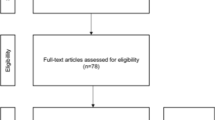Abstract
First coined in 2006, the term ‘crowdsourcing’ began to appear as a concept in academic literature around 2009. Since then academic research on this topic has been showing a rising trend, most prominently in the field of computer science and its subfields. Analysis of the types of motivations for using crowdsourcing shows that extrinsic motivations are mentioned more often in the literature, compared to intrinsic ones. This serves to establish the perception of crowdsourcing as a research method for gaining robust insight on an issue, rather than as a recreational activity for personal development. Finally, the findings of this study reveal that China is emerging as the main funder and producer of papers on crowdsourcing.


source: Clarivate Analytics




Similar content being viewed by others
References
Amsterdamer, Y., & Milo, T. (2014). Foundations of crowd data sourcing. SIGMOD Record, 43(4), 5–14.
Bassi, H., Christopher, J. L., Misener, L., & Johnson, A. M. (2020). Exploring the characteristics of crowdsourcing: An online observational study. Journal of Information Science, 46(3), 291–312. https://doi.org/10.1177/0165551519828626
Certoma, C., Corsini, F., & Rizzi, F. (2015). Crowdsourcing urban sustainability: Data people and technologies in participatory governance. Futures, 74, 93–106.
Dimitrova, S., & Scarso, E. (2017). The impact of crowdsourcing on the evolution of knowledge management: Insights from a case study. Knowledge and Process Management, 24(4), 287–295.
Drabham, D. C. (2009). Crowdsourcing the public participation process for planning projects. Planning Theory, 8(3), 242–262.
Drabham, D. C. (2013). Crowdsourcing. The MIT Press.
Estelle´s-Arolas, E., & Gonza´lez-EFL, F. (2012). Towards an integrated crowdsourcing definition. Journal of Information Science, 38(2), 189–200.
Feng, Y. Y., Hua, J., Yu, Y., Yang, C., & Cui, T. (2018). Gamification artifacts and crowdsourcing participation: Examining the mediating role of intrinsic motivations. Computers in Human Behavior, 81, 124–136.
Ferraz, I. R., Gouvea, M. A., & Barreto, I. F. (2017). Determinants factors of participation in crowdsourcing initiatives. Journal of Management and Technology, 17(1), 107–129.
Ghezzi, A., Gabelloni, D., Martini, A., & Natalicchio, A. (2018). Crowdsourcing: A review and suggestions for future research. International Journal of Management Reviews, 20(2), 343–363.
Gonzalez-Albo, B., & Bordons, M. (2011). Articles vs proceeding papers: Do they differ in research relevance and impact? A case study in the library and Information science field. Journal of Informetrics, 5(3), 369–381.
Heckman, L. (2004). Wisdom of the Crowd (a book review). Library Journal, 129(6), 105–105.
Ingwersen, P., Larsen, B., Garcia-Zorita, J. C., Serrano-López, A. E., & Sanz-Casado, E. (2014). Influence of proceeding papers on citation impact in seven sub-fields of sustainable energy research 2005–2011. Scientometrics, 101(2), 1273–1292.
Liao, P., Wan, Y., Tang, P., Wu, C., Hu, Y., & Zhang, S. (2019). Applying crowdsourcing techniques in urban planning: A bibliometric analysis of research and practice prospects. Cities, 94, 33–43.
Moore, D. S. (1997). Active practice of statistics (p. 233). W.H. Freeman company.
Oishi, K., Cebrian, M., Abeliuk, A., Abeliuk, A., & Masuda, N. (2014). Iterated crowdsourcing dilemma game. Scientific Reports, 4, 4100.
Pinto, S. F. L., & Denner, D. S. C. (2018). Motivations of crowdsourcing contributors. Innovation and Management Review, 15(1), 58–72.
Randhawa, K., Wilden, R., & West, J. (2019). Crowdsourcing without profit: The role of the seeker in open social innovation. R&D Management, 49(30), 298–317.
Surowieck, J. (2004). The wisdom of the crowd. Anchor.
Author information
Authors and Affiliations
Corresponding author
Rights and permissions
About this article
Cite this article
Gordon, A. Crowdsourcing and its relationship to wisdom of the crowd and insight building: a bibliometric study. Scientometrics 126, 4373–4382 (2021). https://doi.org/10.1007/s11192-021-03932-z
Received:
Accepted:
Published:
Issue Date:
DOI: https://doi.org/10.1007/s11192-021-03932-z




